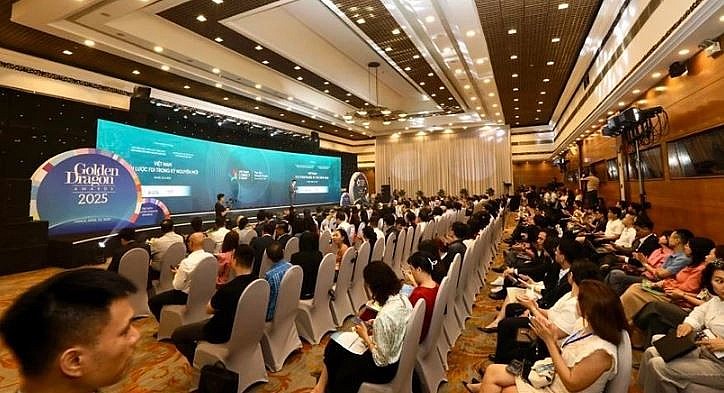 |
| The Vietnam Connect Forum 2025 takes place in Hanoi on April 23. (Photo: VnEconomy) |
As one of the most open economies in the world, coupled with robust infrastructure development, an improved business climate, political stability, and competitive incentive policies, Vietnam continues to be an ideal destination for foreign direct investment (FDI) enterprises.
Vice Chairman of the Party Central Committee's Policy and Strategy Commission Nguyen Hong Son made the remark at the Vietnam Connect Forum 2025 held in Hanoi on April 23.
Themed "Vietnam: FDI strategies in the new era", the forum focused on three key stakeholders: the FDI business sector, local governments, and Vietnamese enterprises, aiming to enhance the efficiency and contribution of the FDI sector, promote the international economic integration of Vietnamese localities, and strengthen the participation of domestic enterprises in global supply chains.
In her opening remarks, Tran Thi Hong Minh, Director of the Central Institute for Economic Management (CIEM), noted that over the past 40 years, Vietnam's economy has grown rapidly, ranking among the top 15 countries globally in FDI attraction. In 2024, the country attracted more than 38 billion USD in FDI. By the end of this year's first quarter, FDI inflows reached nearly 11 billion USD, marking a 34.7% year-on-year increase, a positive signal for Vietnam’s investment environment amidst global economic challenges.
Meanwhile, Son underscored that since the launch of the Doi moi (Renewal) policy in 1986, the Communist Party of Vietnam has maintained a consistent approach to FDI. Rather than merely focusing on quantity and registered capital, Vietnam prioritises quality, efficiency, technology, and environmental standards. Attention has been paid to strengthening linkages between FDI and domestic enterprises, and implementing incentive policies to promote value chains, technology transfer, and the development of industries.
He reaffirmed that over nearly four decades of Doi moi, Vietnam remains consistent in encouraging foreign investment. The country has continued to create an optimal investment environment by improving its legal framework, enhancing administrative reforms, and developing infrastructure and human resources. These efforts have cemented Vietnam’s position as a reliable and attractive destination for international businesses, drawing thousands of investment projects, including high-quality ones from global industry leaders.
However, Son acknowledged that challenges remain in attracting and effectively utilising FDI. These include the limited number of large-scale, high-tech, high value-added projects, and weak linkages between the FDI sector and domestic enterprises. Furthermore, administrative procedures, land clearance issues, and regulations on environmental protection, fire safety, and taxation still present obstacles that directly impact FDI business performance.
Participants at the forum discussed major issues such as the global landscape and shifts in supply chains and FDI flows, Vietnam’s FDI policy directions in the new era, and the role of the FDI sector in fostering effective and strong linkages with the domestic economy. Discussions also looked into measures to promote cooperation between FDI and local businesses, and enhance Vietnamese enterprises’ engagement in FDI-led supply chains.
As part of the forum, the Vietnam Economic Times hosted the Golden Dragon Awards 2025, honouring outstanding FDI enterprises that have demonstrated innovation, led emerging trends, and made significant contributions to socio-economic development in the country./.











































